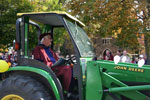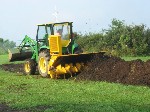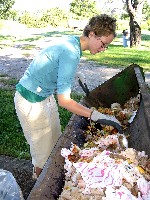Posted on Wednesday, November 19, 2008
Following the Thanksgiving feast and obligatory turkey-induced nap, Westminster College Field Station Director Dr. Clarence Harms urges celebrants to compost the waste and make it a daily celebration.
Harms, professor of biology emeritus, recommends sorting the waste into three sets of plastic bags: RECYCLABLES (aluminum cans and plastic water bottles); REAL TRASH (plastic plates and utensils, plastic cups, aluminum foil, plastic wrap, latex gloves used by servers and the like) and COMPOSTABLES (food waste, uneaten food and even napkins).
The recyclables can be reused to save resources while avoiding landfills, and the compostables can be transformed into nutrient-rich soil - what Harms calls "brown gold."
A recent U.S. Environmental Protection Agency study estimated the United States generates over 250 million tons of municipal solid waste each year. The National Solid Waste Management Association estimates that paper and paperboard products are the largest component in the trash we generate (33.9%), followed by yard trimmings (12.9%), food waste (12.4%), plastic (11.7%), metals (7.6%), wood (5.5%), glass (5.3 %), textiles (4.7%). rubber and leather (2.6%) and other materials (3.4%). Approximately 10% of that amount is recycled, 10% is burned, and the remaining 80% is dumped in landfills.
"We must reeducate ourselves to realize that waste is a resource that can and must be managed," Harms said. "The moral of this story is that a significant percentage of what we might thoughtlessly throw away could be used again. Sure, this takes effort. Our American, present-day life style is preoccupied with packaging and throwing away -- out of sight, out of mind. But when reusables and recyclables are tossed into trash headed for a landfill we have, effectively, lost those materials forever! We can and must do better than that!"
Harms transforms about 230 tons of food waste, leaves, pondweed from Brittain Lake, and shredded paper into 115 tons of good, usable soil each year at Westminster's Field Station. The 230,000 pounds of "brown gold" is used throughout campus and shared with the Borough of New Wilmington for planting projects. Excess compost is also available for purchase.
Harms invites those interested in composting to visit the Westminster College Field Station (937 Fayette-New Wilmington Road). They will find Harms composting most Mondays and generating "brown gold."
Contact Dr. Clarence Harms at (724) 946-8520 or e-mail harmsc@westminster.edu for additional information. Visit www.westminster.edu/green and click on "Notes from the Field Station" for an archive of activities from the Westminster College Field Station.


